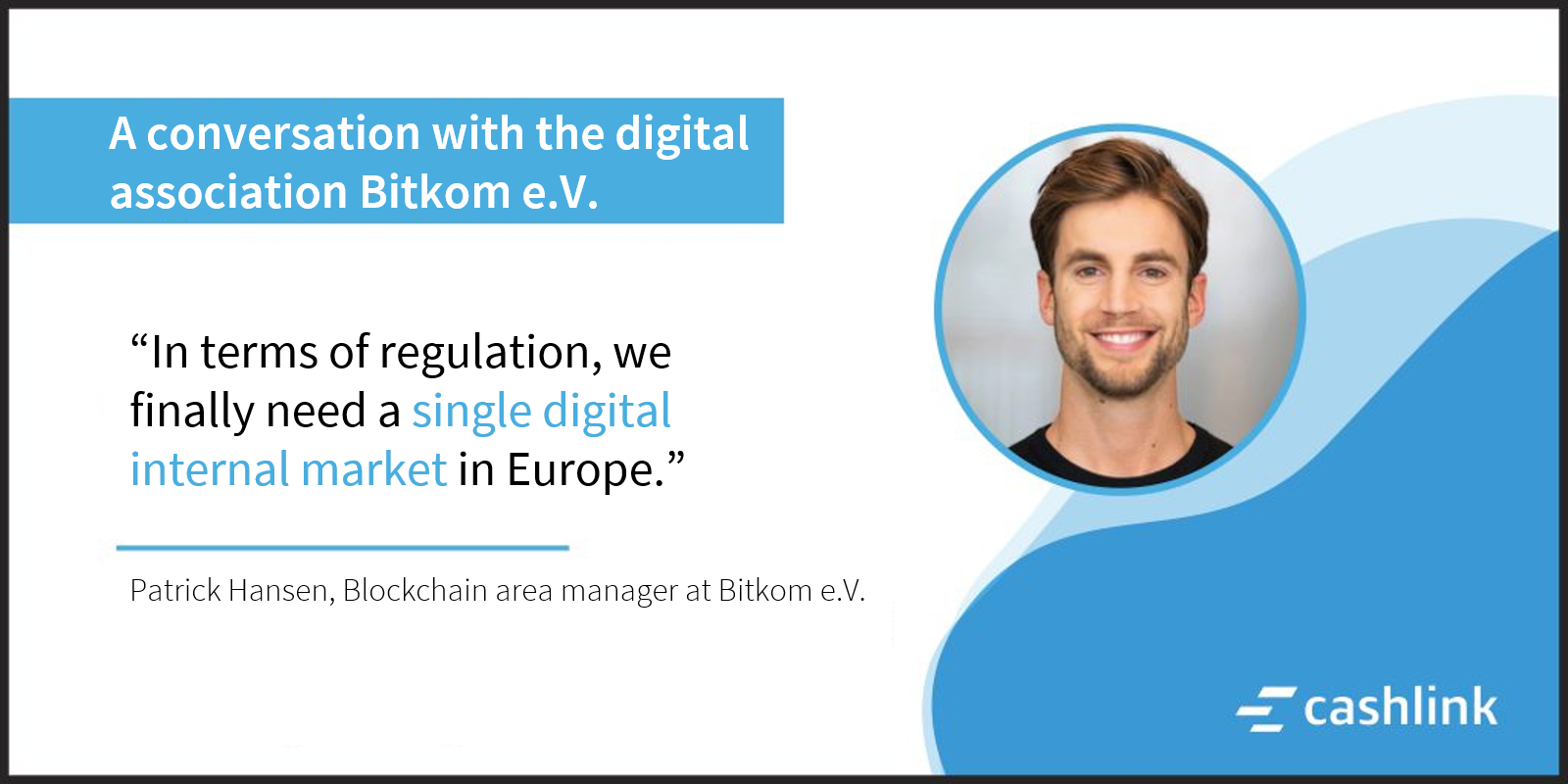

EXPERT INTERVIEW
Europe's role in future relevant technologies: A conversation with Bitkom e.V.




Cashlink: Dear Patrick, we are very happy that we could win you as a conversation partner. Please introduce yourself: Who are you and what do you do with your team at Bitkom in the Blockchain working group?
Patrick Hansen:
Thanks for the invitation! I’m Patrick Hansen and I’m responsible for Blockchain topics and projects at Bitkom, the largest German digital association with almost 2000 direct members. My studies of economics and politics, various experiences in the tech and political context and of course my passion for Blockchain led me to Bitkom in early 2018. Our Blockchain working group brings together tech companies, a large part of the financial industry, numerous blockchain startups, law firms, scientific institutions, and many other global players, medium-sized companies and startups from different blockchain application sectors such as energy, health, or mobility. We see ourselves as the mouthpiece and network between business, politics, and society for block chain topics in Germany.
What we do together with our members: With political talks, consultations and statements, we are committed to ensuring that the opportunities offered by block chain are seen and that block chain-friendly political and regulatory conditions are created. We publish information papers, studies and guidelines on the topic of Blockchain and we ensure a lively exchange among our members through numerous meetings, events and projects. Together we would like to make Germany and the EU a worldwide blockchain hotspot.
Cashlink: While China and the US take leading roles in future relevant technologies and invest heavily in them, Europe often lags behind. In the field of block chain and DLT technology, the current supremacy is still open. How could Germany or the EU succeed in taking a leading role in this initial situation? How would the regulatory framework have to be adapted and what would be the optimal approach?
Patrick Hansen:
In Europe, we are strongly committed to digital sovereignty – which also means security, decentralization and transparency. The Blockchain or DLT fits perfectly with this European credo in digital or data issues, much better than ideas as they prevail in other countries. Moreover, we are in a good starting position with numerous start-ups, corporate projects, and (mostly) comparatively open-minded regulators and supervisors. What is still needed is much more (further) education and enlightenment – especially in the broad sections of society (schools, universities, etc.) and business (small and medium-sized enterprises). In addition, however, much more money is needed for block chain projects and, as a result, much more block chain understanding in the private and public management levels in order to be able to move forward worldwide.
As far as regulation is concerned, we finally need a uniform digital single market in Europe with a legally secure classification of cryptovalences and the associated clear rights and obligations. Here, the European patchwork rug still represents a major brake on growth. The use of block chaining also requires greater legal clarity, for example in data and liability protection, and this applies above all to public permissionless block chains.
Cashlink: Last year, the German government published its block chain strategy & introduced a new law for the safekeeping of digital assets. Which points do you think are particularly important? Which measures should still be taken?
Patrick Hansen: The Federal Government dared here with the cryptover custody license a solo attempt, which went clearly beyond the European defaults, exactly that could turn out however still as drastic competition advantage for local enterprises, should the lining up European regulation follow the German example. The biggest advantage of the custody regulation is the resulting legal security for crypto companies, which enables a whole new spectrum of cooperation with traditional banks and financial service providers. This puts the topic of crypto assets right in the middle of the focus of the regulated financial market for the first time.
However, we have been waiting in vain for the draft law to open up German law to purely electronic securities or security tokens since its announcement in the block chain strategy. This would be another important step towards the Token Economy. The German government has been in debt here for some time.
Cashlink: How can companies, start-ups and also politics in the industry work together even better in the future so that Germany remains competitive?
Patrick Hansen: Every company that wants to participate is welcome to join our Blockchain platform at Bitkom 😉
Cashlink: While China has already implemented a digital central bank currency this year and Facebook’s digital currency Libra is taking shape, the Euro-on-Chain is still lagging behind. How important do you think the introduction of a digital currency is? And what is your forecast for its development?
Patrick Hansen: In the medium term, there will be no getting around a programmable digital euro. The question is rather who emits it and how it is designed. I expect to see more initiatives from the private sector over the next few years, especially from the traditional banking sector, which is worried about parts of its value creation in view of Libra and Co. In the long term, in a digital (and possibly cashless) world, the state will not be able to avoid issuing its own digital central bank euro and giving its population direct access to legal tender. At this point, I would like to refer to our recently published Bitkom information paper on the digital euro on the Blockchain, in which we take a closer look at the motives, design and risks of a digital central bank euro.
Cashlink: Finally, we would like to hear your opinion about the importance of blockchain & DLT technology in the future. In which areas will these technologies have a particularly strong influence throughout Europe in the coming years? And in which role do you see yourself as an association in shaping the future?
Patrick Hansen: For the time being, I still see the biggest influence in the financial sector, where a large part of today’s block chain/DLT applications are located. In addition, we are already experiencing the next disruptive block chain wave with the emerging topic of Decentralized Finance (DeFi). Furthermore, I believe that the areas of supply chain, energy and mobility are among the most advanced in the block chain and DLT area.
At Bitkom, we would like to continue to offer the competent block chain network in Germany, which recognizes these trends and topics at an early stage, analyzes and discusses them technologically (standards, protocols, etc.), economically (use cases, business models, etc.) and legally (security, compliance, etc.) and, in a joint exchange with politicians, advocates innovative framework conditions for the block chain/DLT.
Starten Sie Ihr eigenes Tokenisierungsprojekt
- Unverbindliche & kostenlose Erstberatung durch Experten
- Individuell an Ihre Bedürfnisse angepasste Lösung
- Digitalisierungsprojekte einfach, flexibel & transparent umsetzen


Haben Sie weitere Fragen zu unseren Produktpaketen?
Ich bin Michael, Co-Founder und CEO von Cashlink Technologies! Sollten Sie Fragen zu den einzelnen Produktpaketen haben, zögern Sie nicht und vereinbaren Sie gerne einen unverbindlichen Beratungstermin mit unserem Expertenteam – dieser sollte alle offenen Fragen klären!